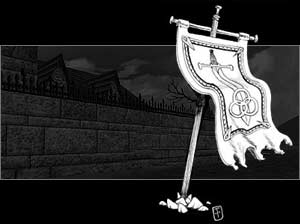Difference between revisions of "Commander"
m |
|||
| Line 10: | Line 10: | ||
|valign=top| | |valign=top| | ||
<div class="center" style="width: auto; margin-left: auto; margin-right: auto;"> | <div class="center" style="width: auto; margin-left: auto; margin-right: auto;"> | ||
| + | [[Image:DisciplineCommander.png|Commander Rune]] | ||
'''<big>Available Races and Classes</big>'''</div> | '''<big>Available Races and Classes</big>'''</div> | ||
*'''Races''': [[Aelfborn]], [[Aracoix]], [[Centaur]], [[Dwarf]], [[Elf]],<br> [[Half Giant]], [[Human]], [[Irekei]], [[Nephilim]], [[Shade]], [[Vampire]] | *'''Races''': [[Aelfborn]], [[Aracoix]], [[Centaur]], [[Dwarf]], [[Elf]],<br> [[Half Giant]], [[Human]], [[Irekei]], [[Nephilim]], [[Shade]], [[Vampire]] | ||
Revision as of 02:16, 6 September 2017
Master of War
| “ | Every Age has produced its great Commanders, masters of strategy and tactics who fight their duels with armies instead of swords, and whose skills and intuition determine the destiny of Nations. To the True Captain's eyes, time is but an illusion. Past, present, future: all of them exist as one. Truly, every battle is over before it begins, and every imaginable outcome is locked within the static present. Any Warrior may study rules of tactics, or observe battles, but a Master of War must have keener eyes: he must see through the consequences of every formation, every movement, through dread and confusion, until only victory is visible. This is how a General knows when to strike, and when to withdraw. This is why he wins. |
” |
Discipline Information
|
Discipline Effects
|
Discipline Dropper
|
Trainer Locations
|

